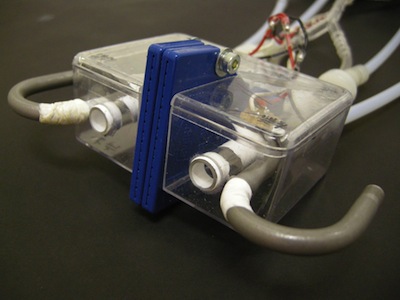
Robohub.org
070
Odor source localization with Hiroshi Ishida and Thomas Lochmatter
In this episode we revisit robot olfaction and take a closer look at the problem of odor source localization. Our first guest, Hiroshi Ishida from the Tokyo University of Agriculture and Technology is an expert in the field, whose sniffing robots range from blimps to ground and underwater robots. Our second guest, Thomas Lochmatter from EPFL talks about tradeoffs between biologically inspired and probabilistic approaches to navigate a gas plume.
Hiroshi Ishida
 Hiroshi Ishida is Associate Professor in the Department of Mechanical Systems Engineering, Tokyo University of Agriculture and Technology, Japan.
Hiroshi Ishida is Associate Professor in the Department of Mechanical Systems Engineering, Tokyo University of Agriculture and Technology, Japan.
The focus of his research group is to develop robots that can find sources of airborne gas plumes or underwater chemical plumes. To this end, they developed the Active Stereo Nose (see figure below), a differential gas sampling system inspired by the dog’s nose, and the Crayfish robot that mimics the mechanism used by crayfish in nature to create unidirectional water currents.

Thomas Lochmatter

image credit: SNF
During his PhD at the Distributed Intelligent Systems and Algorithms Lab at EPFL in Switzerland, Thomas Lochmatter developed a modular odor system for the Khepera III robot. His research focused on the pros and cons of biologically-inspired and probabilistic algorithms for odor localization, while dealing with both single and multi-robot systems.
Links:
- Download mp3 (17.5 MB)
- Subscribe to Robots using iTunes
- Subscribe to Robots using RSS
- Hiroshi Ishida’s Homepage
- Thomas Lochmatter’s Homepage
tags: podcast





